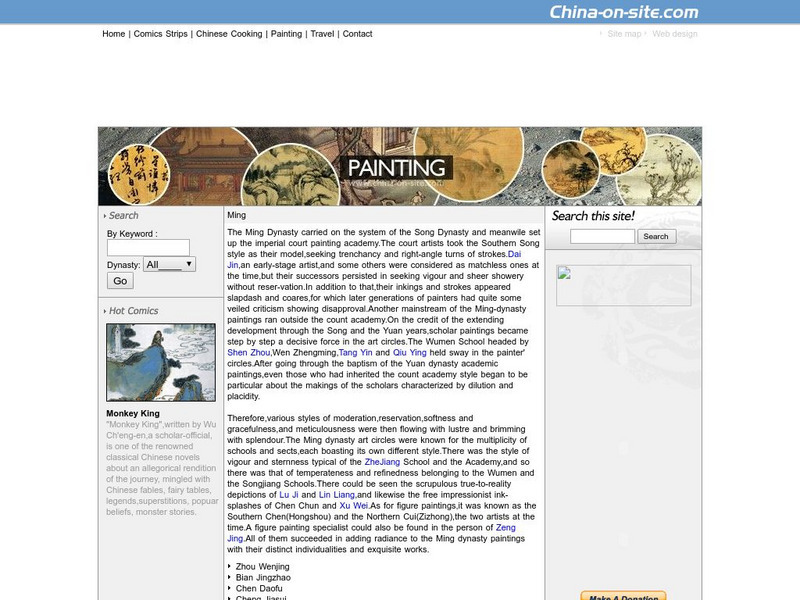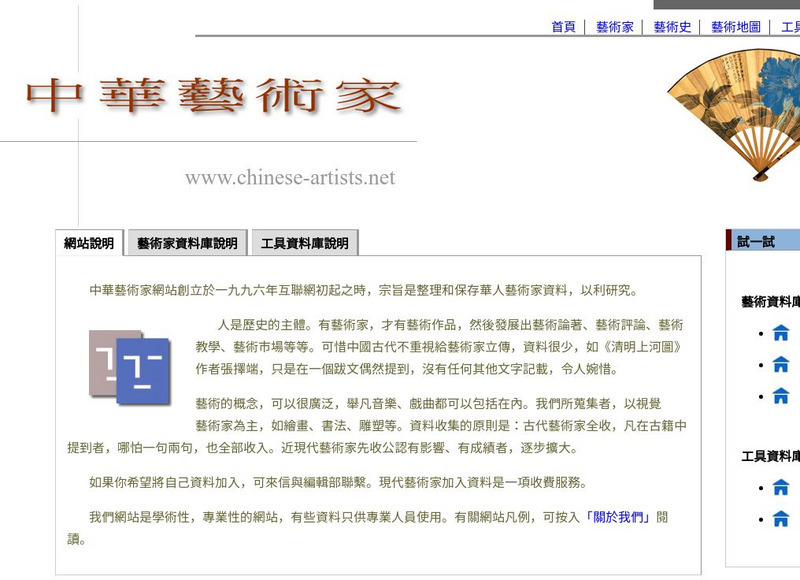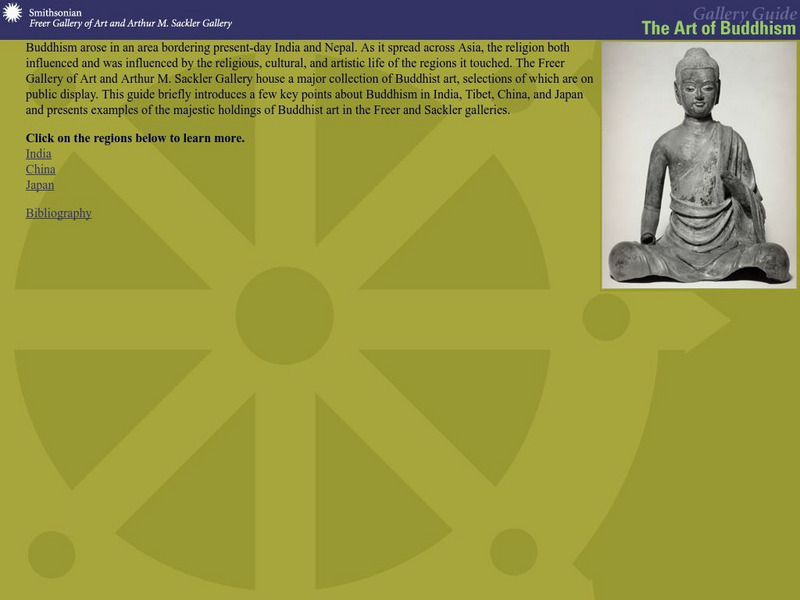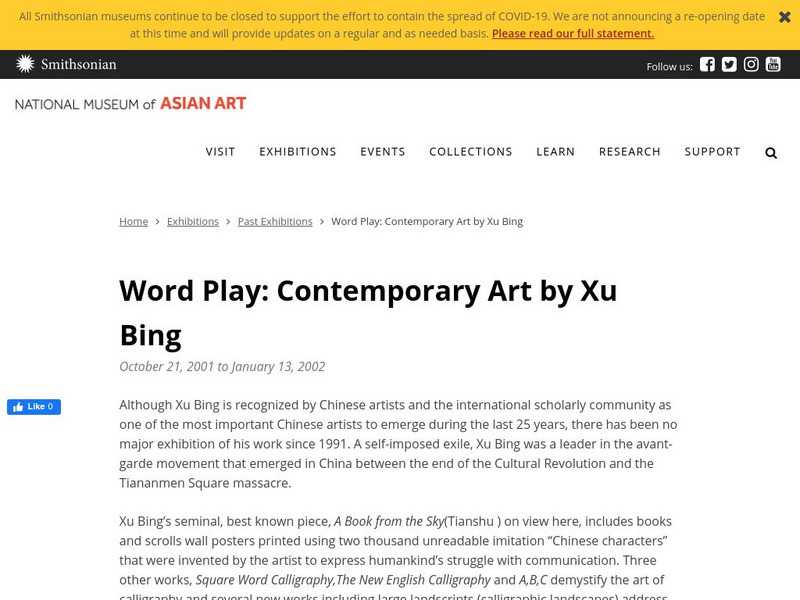Khan Academy
Khan Academy: Introduction to the Han Dynasty
The Han Dynasty is one of the great dynasties in Chinese history, encompassing nearly four hundred years of expansion and consolidation which coincided with the period of the Roman republic and empire in the West. The period is usually...
Khan Academy
Khan Academy: Ritual Wine Vessel (Hu)
Hu were ceremonial-771 B.C.E.). Their shape is typically slender near the top of the vessel, sagging towards the middle. They include a lid, two handles and a base. It is possible that the hu vessel was based on the earlier you vessel....
Khan Academy
Khan Academy: Introduction to China
Much of China, a country slightly larger than the continental United States, is hilly or mountainous. To its east lies the Pacific Ocean; to its south thick jungles. Mountains in the southwest connect in the west with the Himalayas,...
Khan Academy
Khan Academy: Ritual Vessel (Fangyi)
Fangyi is a type of bronze vessel used by the Shang dynasty (approx. 1600-1050 BCE) in ritual ceremonies. The vessel is a small rectangular box used for holding wine ("fang" means square). Such vessels were in use from the Shang through...
Khan Academy
Khan Academy: Technology During the Ming Dynasty (1368 1644)
Scientific investigation also lagged, and by the end of the Ming dynasty China was importing weaponry and weapon technologies from Europe, where shipbuilding and navigational skills had become more advanced. The developments that did...
Khan Academy
Khan Academy: Chinese Jade: An Introduction
What is jade? The English term "jade" is used to translate the Chinese word yu, refers to a number of minerals including nephrite, jadeite, serpentine and bowenite, while jade refers only to nephrite and jadeite. Chemically nephrite is a...
Khan Academy
Khan Academy: Jade Ornament for the Top of an Axe Shaft (Neolithic China)
Graves of the Hongshan culture (about 3800-2700 B.C.E.) might have held as many as 20 jade artifacts while those of the Liangzhu culture (about 3000--2000 B.C.E.) had as many as 300. These included bead necklaces and other decorative...
Khan Academy
Khan Academy: Arts and Humanities: Art of Asia
A landing page for a course on the art history of Asia.
Khan Academy
Khan Academy: The David Vases (Chinese Porcelain)
The David Vases are among the most important examples of blue-and-white porcelain in existence, and are probably the best-known porcelain vases in the world. Read a short description of these vases.
Khan Academy
Khan Academy: Covered Jar With Fish in Lotus Pond
This piece, from the Avery Brundage Collection of the Asian Art Museum in San Francisco, illustrates a method of polychrome decoration in which painting, as well as firing, occurred twice: preceding glaze and over previously fired glaze....
University of Washington
University of Washington: Chinese Gardens
Introduce students to the Chinese garden as an art form with this unit plan.
Other
China on site.com: Ming Dynasty
This site from China-on-site.com has a description of Ming Dynasty artwork as well as links to information on famous artists and their work.
Other
A Collection of Famous Paintings: Introduction
Although this introduces art across China's entire history, it briefly discusses the Shang foundations of artisan skills in jade and bronze.
Other
Chinese Artists
Large database of Chinese artists and works. Search for an artist or look for art pieces from various dynasties. You'll get a short overview and sometimes a picture. The site also includes introductions to Chinese caligraphy, painting...
University of Washington
University of Washington: Chinese Painting [Pdf]
This unit can be taught as a general introduction to Chinese painting orthe two main subsections can be taught independently, depending on whether the teacher is more interested in using painting to teach about other things or wants to...
The British Museum
British Museum: Explore World Cultures: Imperial China
Historical overview of imperial China, with related image gallery of Chinese art objects.
Smithsonian Institution
Freer | Sackler Galleries: Gallery Guide: The Art of Buddhism
An examination of the aesthetic tradition of Buddhist art in India, China, and Japan, with examples pulled from the Smithsonian galleries devoted to the art of Asia.
Smithsonian Institution
Freer | Sackler Galleries: Word Play (The Work of Contemporary Artist Xu Bing)
Contemporary Chinese expatriate artist Xu Bing shares stories, sketches, and photographs of his work in association with a 2001 exhibition of his work at the Smithonson's Sackler Gallery. Word play and language are a focus of Bing's...
















![University of Washington: Chinese Painting [Pdf] Lesson Plan University of Washington: Chinese Painting [Pdf] Lesson Plan](https://d15y2dacu3jp90.cloudfront.net/images/attachment_defaults/resource/large/FPO-knovation.png)

